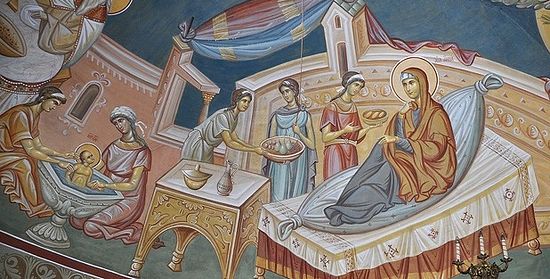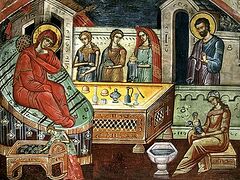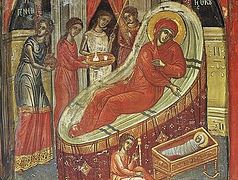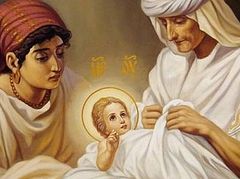 The Nativity of the Mother of God
The Nativity of the Mother of God
In the name of the Father, and of the Son, and of the Holy Spirit.
I greet all of you on the feast of the Nativity of our Most Pure, Most Blessed and Glorious Lady Theotokos and Ever-Virgin Mary! Happy feast, by which the Church calls on us to be born spiritually!
Striving to be closer to God, holiness and perfection on these days, we try to be in church, preparing for the sacrament of Eucharist—the Body and Blood of Christ the Savior.
Every time, while performing the prayer rule, we read some psalms by holy King David, an ancestor of the All-Holy Virgin, that can be found at its beginning, especially the following words:
O Lord, truly I am Thy servant; I am Thy servant, and the son of Thine handmaid (Ps. 115:7).
Inspired by the Holy Spirit, the holy psalmist sings of his servitude and faithfulness to God, but he also sings of her from whom he received the precious gift of life and who raised him in the law of God—His pious mother, who too was a servant of God. How great, holy and absolutely revered was the grace of motherhood and a mother’s upbringing!
But sometimes out of pride, ignorance or egoism the gift of motherhood is rejected as “burdensome”, “inconvenient” for a happy and carefree life, an unnecessary burden in the path of worldly and carnal pleasures.
Then people value friendship with the world, its love, opinions, novelties and passions to the point of enmity against God, abandonment of Him, and ultimately blasphemy against Him. And up the Babylonian ladder of pride they reach a state of shamelessness and profanity, and then blasphemy is declared a personal, sacred and inviolable right. But the struggle for these rights cannot bring peace and consolation to the human soul because it’s a struggle against God. Then people become spiritually dead, even though they’re still physically alive. And the first death (the death of the physical body) leads to the second death—the impossibility of eternal life with God. The holy Elder Nektary (Nectarius; 1853—1928) of Optina rightly said, “Man is given life in order that it might serve him and not vice versa. In serving life, man loses his sense of proportion; he works without any rationale and becomes confused, not knowing why he lives.”1
How we use this gift, how we live our lives and what we can achieve at its (life’s) end depends on each one of us. Everybody is in for the great labor of being born in the spirit—something today’s festivity in honor of the Holy Theotokos calls us to.
For Her life was holy, and four events from this life are particularly commemorated by the Church.
The Virgin Mary came into this world through Her holy parents, Sts. Joachim and Anna, who had been barren for decades.
According to the Holy Fathers, the infertility of Her parents symbolized the spiritual imperfection of the Old Testament era, which was filled with anticipation and expectation of the Messiah.
But the long period of Sts. Joachim and Anna’s childlessness also symbolizes the protracted, oppressive period of our spiritual barrenness, emptiness, and death. For years or even decades we may have neither repentance, nor an awareness, through our own bitter experience, of the simple words of the Apostle Paul: Christ Jesus came into the world to save sinners; of whom I am chief (1 Tim. 1:15). Not our close ones, not our wives or husbands, our children or parents, neighbors, superiors or subordinates, not the entire world—but it’s me, myself, who is a sinner unworthy of God.
Without being certain of this the Christian soul’s return to its Prototype and its spiritual resurrection are impossible.
We need to keep our bond with God alive from the day of our Baptism, just as the Holy Virgin kept the spirit of union with God from the day of Her Entry into the Temple.
Behold the handmaid of the Lord (Lk. 1:38)—these were Her words at the remarkable moment when She received the Good Tidings of the will of God. Do we submit to God’s will, manifest through our life circumstances, as readily as She did?
Are we always ready to repeat both with our hearts and tongues: “Be it unto me according to Thy word (ibid)! May Thy holy will be done! I am Thy servant, O Lord!”
By accepting the holy will of God with the same humility and readiness we attract the Creator’s mercy and offer to ourselves as the Mediator and the Witness of our hope not our earthly mother but the All-Holy Virgin—our Sovereign Lady Theotokos as the Handmaid of God (by Sts. John Chrysostom and Athanasius the Great).
And Her glorious Dormition is the fulfilment of the Apostle Paul’s words: For none of us liveth to himself, and no man dieth to himself. For whether we live, we live unto the Lord; and whether we die, we die unto the Lord: whether we live therefore, or die, we are the Lord's (Rom. 14:7-8).
By instituting this feast close to the beginning of the Church year, a new year of life under the protection of Divine grace, the Holy Church attaches special importance to it as a continuous renewal of the life of the soul in our regeneration through repentance and full participation in the life of the Church. Thereby, o ye mortals, have we been fashioned anew and restored from corruption to life without end (Stichera of the feast for “O Lord, I have cried”, by Stephen of Jerusalem).
And the main Helper and Supplicant in our work of repentance is the Theotokos, to Whom we have all become kin since the moment Her Son first addressed Her from the Cross, Woman, behold thy son, and then addressed St. John the Evangelist: Behold thy Mother (Jn. 19:26-27).
“Our Sovereign Lady is one in spirit with Her Lord, Son and God,” St. John of Kronstadt wrote in his diaries. “Likewise, all saints of God and all who live piously on the earth are one in spirit with the Lord. It is a great mystery and a great honor for those born on earth!” (St. John of Kronstadt’s Diaries, August 2, 1864).
There is a tradition of giving presents to a person on his birthday. We can give presents to the Mother of God as well. Human love and zeal decorate images of the Theotokos on icons with painted and expensive robes, which She never had in Her lifetime but which symbolize Her spiritual beauty and Her soul’s great riches.
True, it is a pious custom to adorn Her icons with flowers. But it is better, worthier and more righteous to adorn our souls with the “flowers” of unfading virtues and keep Her Son’s commandments. No other gift will be dearer or more pleasant to the Queen of Heaven.
Our best gift to Her is to offer Her our humble prayers of repentance for our spiritual imperfection. “Accept my prayerful service and bring it to the compassionate God,” we address the Theotokos in our morning prayers. It depends on us whether the hands of the Heavenly Queen, raised to Christ the Savior on our behalf, will be empty or not.
Perhaps our “prayerful services” are small, and our determination and zeal to guard our hearts from impurity, pride and smugness are weak; but if they have been offered to the Mother of God with faith, humility and love, they will be offered up by Her most pure hands, as if from a censer full of burning coal, to the throne of the King of Glory.
Thus through Her, by Her prayers and by the mercy of God we become partakers of Divine nature and are delivered from death. So let us call out, faithful Christians: O thou who art full of grace, the Lord is with thee, Who grants us the great mercy of salvation and birth to eternal life (Theotokion at the Litya; by Patriarch Sergiy).
Amen.



